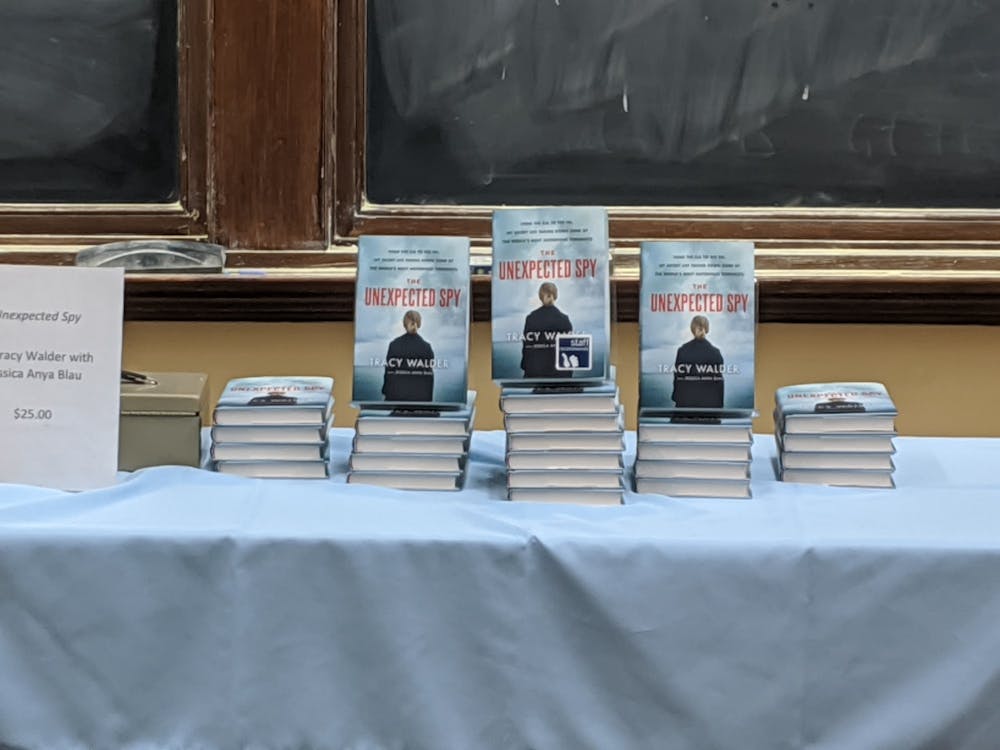Former Federal Bureau of Investigation (FBI) and Central Intelligence Agency (CIA) Operative Tracy Walder spoke about her experiences working at the two agencies, her new book and what she perceives to be the greatest threats to U.S. national security on Friday. Walder’s book, The Unexpected Spy, is a memoir that chronicles her experiences working for the two agencies. Her talk was sponsored by the International Studies program.
Walder explained that she first gave her resume to the CIA at a job fair while attending the University of Southern California. Eventually, she was offered a position at the agency. A history major, Walder stated that she never expected to be working in counterterrorism for the CIA.
During her four-year tenure, she worked with the Drone Program and within the Counterterrorism Center, specifically in the Crude Toxins and Poisons division of the Weapons of Mass Destruction (WMD) Group.
While working in Crude Toxins and Poisons, she attended a “poison school,” where she learned startling information about poisons and toxins, she said.
“You learn, which is slightly disturbing, how easy it is to purchase all of these things and create a bioweapon. It’s really easy,” she said. “Al-Qaeda hid our manual that we found that had a whole chapter on how to produce small scale weapons of mass destruction.”
After discussing her time at the CIA, Walder recalled her move to the position of special agent at the FBI, where she worked within Chinese Counterintelligence to combat Chinese economic espionage.
Walder also highlighted a story of her team sending a suspect onto a cruise so that they could install listening and surveillance devices inside his home.
After leaving the FBI, Walder taught at a high school for women for 14 years. While there, she developed a foreign policy and security curriculum specifically designed to get girls interested in national security.
Walder expressed her concerns about current national security threats. For example, she believes that U.S. President Donald Trump has used the CIA and FBI for his own political purposes. Walder believes that the CIA is an apolitical institution, given that Bill Clinton and George W. Bush had the same CIA director. However, Walder argued that Trump’s recent appointee to the Director of National Intelligence Richard Grenell is biased and has no experience with intelligence
“Trump is trying to put people in places to stop that leakage of information, and I don’t think that’s good for our national security,” Walder said.
She also criticized Trump’s use of the “deep state” narrative to try to discredit intelligence agencies, and recognized that while the CIA certainly has its flaws, perpetuating such a narrative can be dangerous.
Walder cited Chinese economic espionage as another threat to U.S. security, stating that 80 percent of it can be traced back to China. According to Walder, China has obtained U.S. nuclear radar technology, has recruited Americans to steal information and has even been able to hack the Pentagon.
Walder also views domestic terrorism as a large national security threat. She stated that only around 12 percent of the FBI’s budget is dedicated to combating domestic terrorism, when more Americans are killed each year by domestic terrorists than foreign.
She spoke about how the domestic terrorism network is also an international one, such as neo-Nazi hate groups supplying U.S.-based domestic terror organizations with international cells.
“The CIA and FBI are going to need to start to work together in a much better way,” Walder said. “We need to recognize the foreign and domestic nexus of these issues.”
The final national security issue Walder mentioned is the notion that “failed states” breed terrorists.She defined a failed state as a nation that cannot meet the basic needs of its people, leaving the opening for terrorist organizations to take hold and dominate the region. She cited Hezbollah in Egypt and Osama bin-Laden’s role in Sudan as examples.
William Leister, a sophomore and a committee chairman on the International Studies Leadership Council (ISLC), appreciated hearing an intelligence perspective on politicized issues.
“It was very interesting, especially considering the political climate we are in right now, to have a perspective from somebody who actually works in national security compared to somebody who works in politics,” Leister said.
Carmela Irato, a junior and vice president of the ISLC, also noted the importance of having a blend of speakers come to campus.
“CIA and intelligence is a theme that caters to a lot of students. We had former deputy director for the CIA Michael Morell come a couple of weeks ago, and that was super successful,” she said. “Having a lot of perspectives is always better.”





